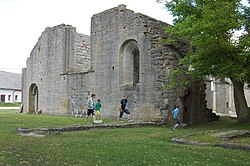Top Qs
Timeline
Chat
Perspective
War in Gotland (1288)
Conflict between peasants and burghers From Wikipedia, the free encyclopedia
Remove ads
The War in Gotland was an armed conflict between the rural farmers of the island of Gotland and the burghers of its town of Visby; two battles were fought, one at Högebro, at which the burghers emerged victorious[1] and Roma, in which neither side won.[1] However, the war concluded with the Treaty of Gotland which was mediated by King Magnus Ladulås.[2]
Remove ads
Background
In the 1280s, in order to stop the rural people of Gotland from trading there, a large wall was constructed around Visby.[3] The construction of the wall was thus the main reason for the war.[4] The farmers asked the German military leader in Livonia for help; he and a few knights are said to have personally traveled to Gotland to help the peasants.[5][4]
Prelude
Possibly with support from Livonian knights, the peasants armed themselves marched toward Visby, intending on attacking the city.[6] In response, the burghers of Visby also mobilized their forces.[6]
Remove ads
War
Summarize
Perspective
When the peasants reached Visby, their assault caught the city's defenders by surprise, and they marched into Visby, plundered, then fled with the booty. The burghers soon organized to counterattack with their allies. The city's troops consisted mostly of hired German mercenaries, but they were well-trained and combat ready.[7]
The two sides eventually met at Högebro; the battle was hard-fought and lasted the entire day. Despite initial success by the peasants, the burghers eventually ended up victorious due to superiority in weapons. The defeated farmers retreated into a forest, but were pursued by the burghers' forces, resulting in many being captured and taken to Sjönem. However, the farmers did not lose hope, and mobilized for another battle.[6]
At Roma monastery, they engaged in another battle. Both sides suffered heavy casualties,[6] but the battle was inconclusive. After the battle, the priests of the Roma monastery intervened and, managed to broker a truce after persistence.[8]
But peace was not made there. The peasants withdrew from negotiations repeatedly, and it was with great difficulty that the priests were able to prevent the renewal of battle. Finally, Bodel Kallin and Gerved of Martebo declared on behalf of the peasants that Edvard von Lode and several knights wanted to enter the city themselves and confirm the peace. That was how things stood when the news reached Magnus Ladulås about what was occurring on the island; the king promptly sent word that diplomats for both parties should come to him.[6] Magnus also landed troops on the island, taking the side of the peasants.[9]
Portrait of Magnus III of Sweden from the 1400s located in Riddarholmskyrkan
Remove ads
Aftermath
Summarize
Perspective
In August 1288, Magnus Ladulås summoned representatives from both sides to Nyköping to broker peace between them. The envoys admitted that the burghers of Visby had gone against the king's will when they constructed the wall. They therefore paid 2,000 marks of silver and 500 mark assorted silver in penance.[6]
The Visby burghers also agreed that if any further disagreement arose between Visby and the peasants, the matter would be referred to the king first, before the burghers escalated it into any hostility against the peasants. However, no such notification would be needed if such a fierce attack by the peasants took place that violence had to be met by violence.[6]
Furthermore, any complaints by the peasants to the king would not be hindered from reaching him. Only the king would be their master, and if the peasants ever attempted to reject his authority, Visby would fight against it. Additionally, should the peasants rebel against the king, the burghers, as soon as requested to, would keep their gates open to the king, and give the king all possible help against the peasants.[8]
Result
The exact victor in the war is disputed. Historian Mats Adolfsson says that the peasants won the war,[10] while Edward Miller says that the burghers of Visby won the war.[11] Christine Peel, while mentioning a burgher victory, also mentions how they suffered a humiliating surrender to the king.[12]
See also
References
Wikiwand - on
Seamless Wikipedia browsing. On steroids.
Remove ads



